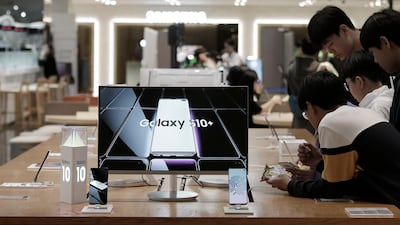Global smartphone shipments declined around 4 per cent year-on-year in the first quarter of 2019 due to longer upgrade cycles and weaker consumer demand, according to a new report.
Around 330.4 million smartphones were shipped in the three months ending March 31, 15 million less than the same period last year, according to research company Strategy Analytics based in Boston. Despite the decline, analysts say the industry will improve this year as major markets such as China show stronger demand.
“The market has declined again on an annual basis, but the fall is less severe than before, and this was the industry’s best performance for three quarters,” said Linda Sui, director at Strategy Analytics.
Despite a dip of 8 per cent in smartphone shipments, South Korea's Samsung maintained its top position with 21.7 per cent market share in the first quarter, ahead of Huawei and Apple, which account for 17.9 per cent and 13 per cent of the global market, respectively.
Samsung, which launched its Galaxy 10 series in February, postponed the roll-out of its flagship product Galaxy Fold after a series of bad reviews in April.
“Samsung remains the world’s number one smartphone vendor, but it is coming under growing pressure from Huawei, who has larger presence in the huge China market,” said Neil Mawston, executive director at Strategy Analytics.
“Huawei is closing in on Samsung and streaking ahead of Apple, due to its strong presence across China, Western Europe and Africa.”
Shenzhen-headquartered Huawei surged 50 per cent annually and outgrew all major rivals to ship 59.1 million smartphones worldwide in the first quarter, up from 39.3 million during the same period last year. The company grew its shipments by 35 per cent, shipping a record 205.8 million units across the globe in 2018.
The survey found that Apple lost ground in China during the quarter and is struggling to make headway in price-sensitive India. But price cuts in both markets in recent weeks indicate that iPhone has room to bounce back.


